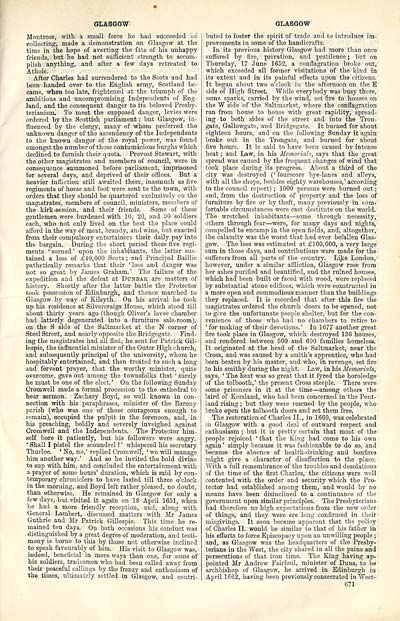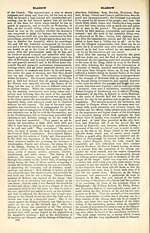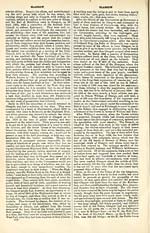Ordnance gazetteer of Scotland
(679) Page 671 - GLA
Download files
Complete book:
Individual page:
Thumbnail gallery: Grid view | List view

GLASGOW
Montrose, with a small force he had succeeded in
collecting, made a demonstration on Glasgow at the
time in the hope of averting the fate of his unhappy
friends, but he had not sufficient strength to accom-
plish anything, and after a few days retreated to
Athole.
After Charles had surrendered to the Scots and had
been handed over to the English army, Scotland be-
came, when too late, frightened at the triumph of the
ambitious and uncompromising Independents of Eng-
land, and the consequent danger to its beloved Presby-
terianism. To meet the supposed danger, levies were
ordered by the Scottish parliament ; but Glasgow, in-
fluenced by the clergy, many of whom preferred the
unknown danger of the ascendency of the Independents
to the known danger of the royal power, was found
amongst the number of those contumacious burghs which
declined to furnish their quota. Provost Stewart, with
the other magistrates and members of council, were in
consequence summoned before parliament, imprisoned
for several days, and deprived of their offices. But a
heavier infliction still awaited them, inasmuch as five
regiments of horse and foot were sent to the town, with
orders that they should be quartered exclusively on the
magistrates, members of council, ministers, members of
the kirk-session, and their friends. Some of these
gentlemen were burdened with 10, 20, and 30 soldiers
each, who not only lived on the best the place could
afford in the way of meat, brandy, and wine, but exacted
from their compulsory entertainers their daily pay into
the bargain. During the short period these five regi-
ments 'sorned' upon the inhabitants, the latter sus-
tained a loss of £40,000 Scots ; and Principal Baillie
pathetically remarks that their ' loss and danger was
not so great by James Graham.' The failure of the
expedition and the defeat at Dunbar are matters of
history. Shortly after the latter battle the Protector
took possession of Edinburgh, and thence marched to
Glasgow by way of Kilsyth. On his arrival he took
up his residence at Silvercraigs House, which stood till
about thirty years ago (though Oliver's levee chamber
had latterly degenerated into a furniture sale-room),
on the S side of the Saltmarket at the N corner of
Steel Street, and nearly opposite the Bridgegate. Find-
ing the magistrates had all fled, he sent for Patrick Gil-
lespie, the influential minister of the Outer High church,
and subsequently principal of the university, whom he
hospitably entertained, and then treated to such a long
and fervent prayer, that the worthy minister, quite
overcome, gave but among the townsfolks that ' surely
he must be one of the elect.' On the following Sunday
Cromwell made a formal procession to the cathedral to
hear sermon. Zachary Boyd, so well known in con-
nection with his paraphrases, minister of the Barony
parish (who was one of those courageous enough to
remain), occupied the pulpit in the forenoon, and, in
his preaching, boldly and severely inveighed against
Cromwell and the Independents. The Protector him-
self bore it patiently, but his followers were angry.
' Shall I pistol the scoundrel ? ' whispered his secretary
Thurloe. ' No, no,' replied Cromwell, ' we will manage
him another way.' And so he invited the bold divine
to sup with him, and concluded the entertainment with
a prayer of some hours' duration, which is said by con-
temporary chroniclers to have lasted till three o'clock
in the morning, and Boyd left rather pleased, no doubt,
than otherwise. He remained in Glasgow for only a
few days, but visited it again on 18 April 1651, when
he had a more friendly reception, and, along with
General Lambert, discussed matters with Mr' James
Guthrie and Mr Patrick Gillespie. This time he re-
mained ten days. On both occasions his conduct was
distinguished by a great degree of moderation, and testi-
mony is borne to this by those not otherwise inclined
to speak favourably of him. His visit to Glasgow was,
indeed, beneficial in more ways than one, for some of
his soldiers, tradesmen who had been called away from
their peaceful callings by the frenzy and enthusiasm of
the times, ultimately settled in Glasgow, and contri-
GLASGOW
buted to foster the spirit of trade and to introduce im-
provements in some of the handicrafts.
In its previous history Glasgow had more than once
suffered by fire, privation, and pestilence ; but on
Thursday, 17 June 1652, a conflagration broke out,
which exceeded all former visitations of the kind in
its extent and in its painful effects upon the citizens.
It began about two o'clock in the afternoon on the E
side of High Street. While everybody was busy there,
some sparks, carried by the wind, set fire to houses on
the W side of the Saltmarket, where the conflagration
ran from house to house with great rapidity, spread-
ing to both sides of the street and into the Tron-
gate, Gallowgate, and Bridgegate. It burned for about
eighteen hours, and on the following Sunday it again
broke out in the Trongate, and burned for about
five hours. It is said to have been caused by intense
heat ; and Law, in his Memorials, says that the great
spread was caused by the frequent changes of wind that
took place during its progress. About a third of the
city was destroyed (' fourscore bye-lanes and alleys,
with all the shops, besides eighty warehouses, ' according
to the council report) ; 1000 persons were burned out ;
and, from the destruction of property and the loss of
furniture by fire or by theft, many previously in com-
fortable circumstances were cast destitute on the world.
The wretched inhabitants — some through necessity,
others through fear — were, for many days and nights,
compelled to encamp in the open fields, and, altogether,
the calamity was the worst that had ever befallen Glas-
gow. The loss was estimated at £100,000, a very large
sum in those days, and contributions were made for the
sufferers from all parts of the country. Like London,
however, under a similar affliction, Glasgow rose from
her ashes purified and beautified, and the ruined houses,
which had been built or faced with wood, were replaced
by substantial stone edifices, which were constructed in
a more open and commodious manner than the buildings
they replaced. It is recorded that after this fire the
magistrates ordered the church doors to be opened, not
to give the unfortunate people shelter, but for the con-
venience of those who had no chambers to retire to
' for making of their devotions. ' In 1677 another great
fire took place in Glasgow, which destroyed 136 houses,
and rendered between 500 and 600 families homeless.
It originated at the head of the Saltmarket, near the
Cross, and was caused by a smith's apprentice, who had
been beaten by his master, and who, m revenge, set fire
to his smithy during the night. Law, in his Memorials,
says, ' The heat was so great that it fyred the horoledge
of the tolbooth,' the present Cross steeple. There were
some prisoners in it at the time — among others the
laird of Eersland, who had been concerned in the Pent-
land rising ; but they were rescued by the people, who
broke open the tolhooth doors and set them free.
The restoration of Charles II., in 1660, was celebrated
in Glasgow with a good deal of outward respect and
enthusiasm ; but it is pretty certain that most of the
people rejoiced ' that the King had come to his own
again ' simply because it was fashionable to do so, and
because the absence of health-drinking and bonfires
might give a character of disaffection to the place.
With a full remembrance of the troubles and desolations
of the time of the first Charles, the citizens were well
contented with the order and security which the Pro-
tector had established among them, and would by no
means have been disinclined to a continuance of the
government upon similar principles. The Presbyterians
had therefore no high expectations from the new order
of things, and they were ere long confirmed in their
misgivings. It soon became apparent that the policy
of Charles II. would be similar to that of his father in
his efforts to force Episcopacy upon an unwilling people ;
and, as Glasgow was the headquarters of the Presby-
terians in the West, the city shared in all the pains and
persecutions of that iron time. The King having ap-
pointed Mr Andrew Fairfoul, minister of Duns, to be
archbishop of Glasgow, he arrived in Edinburgh in
April 1662, having been previously consecrated in West-
671
Montrose, with a small force he had succeeded in
collecting, made a demonstration on Glasgow at the
time in the hope of averting the fate of his unhappy
friends, but he had not sufficient strength to accom-
plish anything, and after a few days retreated to
Athole.
After Charles had surrendered to the Scots and had
been handed over to the English army, Scotland be-
came, when too late, frightened at the triumph of the
ambitious and uncompromising Independents of Eng-
land, and the consequent danger to its beloved Presby-
terianism. To meet the supposed danger, levies were
ordered by the Scottish parliament ; but Glasgow, in-
fluenced by the clergy, many of whom preferred the
unknown danger of the ascendency of the Independents
to the known danger of the royal power, was found
amongst the number of those contumacious burghs which
declined to furnish their quota. Provost Stewart, with
the other magistrates and members of council, were in
consequence summoned before parliament, imprisoned
for several days, and deprived of their offices. But a
heavier infliction still awaited them, inasmuch as five
regiments of horse and foot were sent to the town, with
orders that they should be quartered exclusively on the
magistrates, members of council, ministers, members of
the kirk-session, and their friends. Some of these
gentlemen were burdened with 10, 20, and 30 soldiers
each, who not only lived on the best the place could
afford in the way of meat, brandy, and wine, but exacted
from their compulsory entertainers their daily pay into
the bargain. During the short period these five regi-
ments 'sorned' upon the inhabitants, the latter sus-
tained a loss of £40,000 Scots ; and Principal Baillie
pathetically remarks that their ' loss and danger was
not so great by James Graham.' The failure of the
expedition and the defeat at Dunbar are matters of
history. Shortly after the latter battle the Protector
took possession of Edinburgh, and thence marched to
Glasgow by way of Kilsyth. On his arrival he took
up his residence at Silvercraigs House, which stood till
about thirty years ago (though Oliver's levee chamber
had latterly degenerated into a furniture sale-room),
on the S side of the Saltmarket at the N corner of
Steel Street, and nearly opposite the Bridgegate. Find-
ing the magistrates had all fled, he sent for Patrick Gil-
lespie, the influential minister of the Outer High church,
and subsequently principal of the university, whom he
hospitably entertained, and then treated to such a long
and fervent prayer, that the worthy minister, quite
overcome, gave but among the townsfolks that ' surely
he must be one of the elect.' On the following Sunday
Cromwell made a formal procession to the cathedral to
hear sermon. Zachary Boyd, so well known in con-
nection with his paraphrases, minister of the Barony
parish (who was one of those courageous enough to
remain), occupied the pulpit in the forenoon, and, in
his preaching, boldly and severely inveighed against
Cromwell and the Independents. The Protector him-
self bore it patiently, but his followers were angry.
' Shall I pistol the scoundrel ? ' whispered his secretary
Thurloe. ' No, no,' replied Cromwell, ' we will manage
him another way.' And so he invited the bold divine
to sup with him, and concluded the entertainment with
a prayer of some hours' duration, which is said by con-
temporary chroniclers to have lasted till three o'clock
in the morning, and Boyd left rather pleased, no doubt,
than otherwise. He remained in Glasgow for only a
few days, but visited it again on 18 April 1651, when
he had a more friendly reception, and, along with
General Lambert, discussed matters with Mr' James
Guthrie and Mr Patrick Gillespie. This time he re-
mained ten days. On both occasions his conduct was
distinguished by a great degree of moderation, and testi-
mony is borne to this by those not otherwise inclined
to speak favourably of him. His visit to Glasgow was,
indeed, beneficial in more ways than one, for some of
his soldiers, tradesmen who had been called away from
their peaceful callings by the frenzy and enthusiasm of
the times, ultimately settled in Glasgow, and contri-
GLASGOW
buted to foster the spirit of trade and to introduce im-
provements in some of the handicrafts.
In its previous history Glasgow had more than once
suffered by fire, privation, and pestilence ; but on
Thursday, 17 June 1652, a conflagration broke out,
which exceeded all former visitations of the kind in
its extent and in its painful effects upon the citizens.
It began about two o'clock in the afternoon on the E
side of High Street. While everybody was busy there,
some sparks, carried by the wind, set fire to houses on
the W side of the Saltmarket, where the conflagration
ran from house to house with great rapidity, spread-
ing to both sides of the street and into the Tron-
gate, Gallowgate, and Bridgegate. It burned for about
eighteen hours, and on the following Sunday it again
broke out in the Trongate, and burned for about
five hours. It is said to have been caused by intense
heat ; and Law, in his Memorials, says that the great
spread was caused by the frequent changes of wind that
took place during its progress. About a third of the
city was destroyed (' fourscore bye-lanes and alleys,
with all the shops, besides eighty warehouses, ' according
to the council report) ; 1000 persons were burned out ;
and, from the destruction of property and the loss of
furniture by fire or by theft, many previously in com-
fortable circumstances were cast destitute on the world.
The wretched inhabitants — some through necessity,
others through fear — were, for many days and nights,
compelled to encamp in the open fields, and, altogether,
the calamity was the worst that had ever befallen Glas-
gow. The loss was estimated at £100,000, a very large
sum in those days, and contributions were made for the
sufferers from all parts of the country. Like London,
however, under a similar affliction, Glasgow rose from
her ashes purified and beautified, and the ruined houses,
which had been built or faced with wood, were replaced
by substantial stone edifices, which were constructed in
a more open and commodious manner than the buildings
they replaced. It is recorded that after this fire the
magistrates ordered the church doors to be opened, not
to give the unfortunate people shelter, but for the con-
venience of those who had no chambers to retire to
' for making of their devotions. ' In 1677 another great
fire took place in Glasgow, which destroyed 136 houses,
and rendered between 500 and 600 families homeless.
It originated at the head of the Saltmarket, near the
Cross, and was caused by a smith's apprentice, who had
been beaten by his master, and who, m revenge, set fire
to his smithy during the night. Law, in his Memorials,
says, ' The heat was so great that it fyred the horoledge
of the tolbooth,' the present Cross steeple. There were
some prisoners in it at the time — among others the
laird of Eersland, who had been concerned in the Pent-
land rising ; but they were rescued by the people, who
broke open the tolhooth doors and set them free.
The restoration of Charles II., in 1660, was celebrated
in Glasgow with a good deal of outward respect and
enthusiasm ; but it is pretty certain that most of the
people rejoiced ' that the King had come to his own
again ' simply because it was fashionable to do so, and
because the absence of health-drinking and bonfires
might give a character of disaffection to the place.
With a full remembrance of the troubles and desolations
of the time of the first Charles, the citizens were well
contented with the order and security which the Pro-
tector had established among them, and would by no
means have been disinclined to a continuance of the
government upon similar principles. The Presbyterians
had therefore no high expectations from the new order
of things, and they were ere long confirmed in their
misgivings. It soon became apparent that the policy
of Charles II. would be similar to that of his father in
his efforts to force Episcopacy upon an unwilling people ;
and, as Glasgow was the headquarters of the Presby-
terians in the West, the city shared in all the pains and
persecutions of that iron time. The King having ap-
pointed Mr Andrew Fairfoul, minister of Duns, to be
archbishop of Glasgow, he arrived in Edinburgh in
April 1662, having been previously consecrated in West-
671
Set display mode to: Large image | Transcription
Images and transcriptions on this page, including medium image downloads, may be used under the Creative Commons Attribution 4.0 International Licence unless otherwise stated. ![]()
| Gazetteers of Scotland, 1803-1901 > Ordnance gazetteer of Scotland > (679) Page 671 - GLA |
|---|
| Permanent URL | https://digital.nls.uk/97401394 |
|---|

